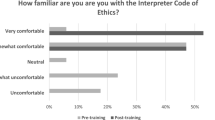Abstract
OBJECTIVES: To develop and evaluate a web-based curriculum to introduce first year medical students to the knowledge and attitudes necessary for working with limited English proficient (LEP) patients through interpreters.
METHOD: Six hundred and forty first year medical students over 4 consecutive years took this curriculum as part of their Patient Physician and Society course. They viewed 6 patient-physician-interpreter video vignettes, gave open text analyses of each vignette, and compared their responses to those generated by experts, thereby receiving immediate formative feedback. They listened to video commentaries by a cultural expert, lawyer, and ethicist about working with LEP patients, completed pre- and postmodule questionnaires, which tested relevant knowledge and attitudes, and were provided a summative assessment at the end of the module. Students completed an optional survey assessing the educational value of, and providing open text commentary about, the module.
RESULTS: Seventy-one percent (n=456) of first year students who completed the module consented to have their data included in this evaluation. Mean knowledge (19 items) scores improved (46% pre- to 62% postmodule, P<.001), reflecting improvements in knowledge about best interpreter practices and immigration demographics and legal issues. Mean scores on 4 of 5 attitude items improved, reflecting attitudes more consistent with culturally sensitive care of LEP patients. Mean satisfaction with the educational value of the module for 155 students who completed the postmodule survey was 2.9 on a scale of 1 to 4.
CONCLUSION: Our web-curriculum resulted in short-term improvement in the knowledge and attitudes necessary to interact with LEP patients and interpreters. The interactive format allowed students to receive immediate formative feedback and be cognizant of the challenges and effective strategies in language discordant medical encounters. This is important because studies suggest that the use of these skills in patient encounters leads to greater patient and provider satisfaction and improved health outcomes.
Similar content being viewed by others
References
Nora LM, Daugherty SR, Mattis-Peterson A, Stevenson L, Goodman LJ. Improving cross-cultural skills of medical students through medical school-community partnerships. West J Med. 1994;161:144–7.
Language Use and English-Speaking Ability. United States Census, 2000:1–3, Available at http://www.census.gov/prod/2003pubs/c2kbr-29.pdf. Accessed October 1, 2004.
U.S. Department of Health and Human Services, Office of Minority Health. National standards of cultural and linguistically appropriate services in health care. 2000. Available at: http://www.omhrc.gov/clas/. Accessed March 24, 2005.
Karliner LS, Perez-Stable EJ, Gildengorin G. The language divide. The importance of training in the use of interpreters for outpatient practice. J Gen Intern Med. 2004;19:175–83.
Ngo-Metzger Q, Massagli MP, Clarridge BR, et al. Linguistic and cultural barriers to care. J Gen Intern Med. 2003;18:44–52.
Flores G, Gee D, Kastner B. The teaching of cultural issues in U.S. and Canadian medical schools. Acad Med. 2000;75:451–5.
Chumley-Jones HS, Dobbie A, Alford CL. Web-based learning: sound educational method or hype? A review of the evaluation literature. Acad Med. 2002;77:S86–93.
Cook D, Dupras DM. A practical guide to developing effective web-based learning. J Gen Intern Med. 2004;19:698–707.
Nguyen AN, Uthman MO, Johnson KA. A web-based teaching program for laboratory diagnosis of coagulation disorders. Arch Pathol Lab Med. 2000;124:588–93.
Erwin TD, Rieppi R. Comparing multimedia and traditional approaches in undergraduate psychology classes. Teaching Psychol. 1999;58–61.
Kaelber DC, Bierer SB, Carter JR. A web-based clinical curriculum on the cardiac exam. Acad Med. 2001;76:548–9.
McKimm J, Jollie C, Cantillon P. ABC of learning and teaching: web based learning. BMJ. 2003;326:870–3.
Jacobs EA, Lauderdale DS, Meltzer D, Shorey JM, Levinson W, Thisted RA. Impact of interpreter services on delivery of health care to limited-English-proficient patients. J Gen Intern Med. 2001;16:468–74.
Yedidia MJ, Gillespie CC, Kachur E, et al. Effect of communications training on medical student performance. JAMA. 2003;290:1157–65.
Michael S, Gany F. Immigrant health in New York: meeting the challenges. Innov Soc Sci Res. 1993;6:55–65.
Carrillo JE, Green AR, Betancourt JR. Cross-cultural primary care: a patient-based approach. Ann Intern Med. 1999;130:829–34.
Monroe AD, Shirazian T. Challenging linguistic barriers to health care: students as medical interpreters. Acad Med. 2004;79:118–22.
Kamaka ML. Cultural immersion in a cultural competency curriculum. Acad Med. 2001;76:512.
Brainin-Rodriguez JE. A course about culture and gender in the clinical setting for third-year students. Acad Med. 2001;76:512–3.
Godkin M, Weinreb L. A pathway on serving multicultural and underserved populations. Acad Med. 2001;76:513–4.
Altshuler L, Kachur E. A culture OSCE: teaching residents to bridge different worlds. Acad Med. 2001;76:514.
Takayama JI, Chandran C, Pearl DB. A one-month cultural competency rotation for pediatrics residents. Acad Med. 2001;76:514–5.
Goleman MJ. Teaching pediatrics residents to communicate with patients across differences. Acad Med. 2001;76:515–6.
Koschmann T. Medical education and computer literacy: learning about, through, and with computers. Acad Med. 1995;70:818–21.
Novack DH, Cohen D, Peitzman SJ, Beadenkopf S, Gracely E, Morris J. A pilot test of WebOSCE: a system for assessing trainees’ clinical skills via teleconference. Med Teach. 2002;24:483–7.
Betancourt JR. Cross-cultural medical education: conceptual approaches and frameworks for evaluation. Acad Med. 2003;78:560–9.
Author information
Authors and Affiliations
Corresponding author
Additional information
The authors have no conflicts of interest, financial or otherwise, to declare for this article or this research.
The Description was published as Innovations in Medical Education (500 word abstract) in: Kalet, A, Gany, F, Senter, L. Working with Interpreters: An Interactive Web-based Learning Module. Acad Med. 2002; 77: 927.
This research was presented as an “Innovations in Medical Education” poster at the 26th Annual SGIM Meeting, May 2003, Vancouver, BC.
This study was funded in part by Josiah Macy Foundation and the Kellogg Foundation.
Rights and permissions
About this article
Cite this article
Kalet, A.L., Mukherjee, D., Felix, K. et al. Can a web-based curriculum improve students’ knowledge of, and attitudes about, the interpreted medical interview?. J GEN INTERN MED 20, 929–934 (2005). https://doi.org/10.1111/j.1525-1497.2005.0193.x
Received:
Revised:
Accepted:
Issue Date:
DOI: https://doi.org/10.1111/j.1525-1497.2005.0193.x




